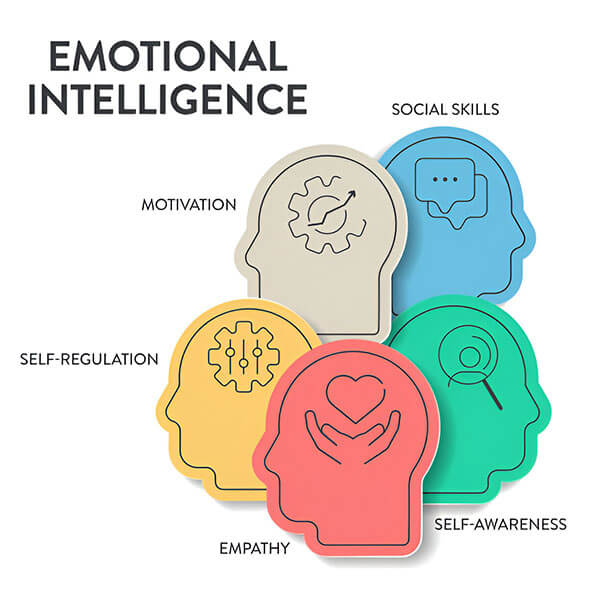Never underestimate the importance of emotional intelligence and empathy in today’s business world. Such skills empower leaders to engage and retain their teams, create a productive workplace culture, and consequently contribute to organizational success. So, in this article, we will dissect what emotional intelligence and empathy really are, why they matter for effective leadership, as well as provide some tactical tips to help you start building or improving this crucial set of skills-the human side.
Understanding Emotional Intelligence and Empathy
What is Emotional Intelligence?

Emotional intelligence (EI) is the capacity to recognize one’s own and those of others. It is comprised of four main elements.
Emotional Self-Awareness: The ability to understand our own emotions and how they can drive our behavior, impact people (positively or negatively), and make more conscious choices.
Self-Management: The ability to effectively manage your own emotions, thoughts, and behaviors in different situations – effectively managing stress, controlling impulses, and pursuing goals with energy & persistence.
Social Awareness: The ability to read the emotions of others and be comfortable with navigating social terrain.
Relationship Management: Break the opportunity to create new contacts, communicate effectively, and show competence in inspiring others as well as working within teams or groups while handling conflicts.
What is Empathy?
Empathy, which is an important form of social awareness, means understanding and sharing the feelings of others. It enables leaders to build a stronger relationship with their team, and so increases trust and authenticity, which naturally feeds into the cooperation.
How Entrepreneurship as a Career Can Transform Your Life. Discover the Benefits, Opportunities, and Success Path of Becoming an Entrepreneur.
The Importance of Emotional Intelligence and Empathy in Leadership
Enhancing Communication
Effective communication can be facilitated through good emotional intelligence and empathy among the leaders. This makes them more capable of acknowledging the concerns and emotions of their team members, which results in a better exchange during discussions.
Improved Relationship Building
The quality of empathy is what makes leaders have deeper, more emotional ties to their team members. Employees who feel appreciated and cared about are also those who will be more engaged, motivated, and have a sense of commitment to their work.
Improving Conflict Resolution
It helps the leaders to manage and solve conflicts, too. They can take into consideration how those involved are feeling and what they’re thinking, for them to attend disputes without all parties being uncomfortable with their situation, whilst providing everyone a more than fair solution.
Creating a Friendly Workplace
Emotional intelligence and empathy are the fabric of compassion in a leader. Such an environment leads to creative and collaborative work with high-performance outcomes that ultimately benefit the company.
Strategies for Developing Emotional Intelligence and Empathy
1. Self-check and Reflect:
It starts with the development of emotional intelligence from self-awareness. Take time regularly to reflect on your feelings, your actions, and how they make other people feel. Keep a journal to write down how you are feeling and identify patterns, or areas for growth.
Actionable Steps:
- Daily Reflection: Try to find a minute or two a day where you can reflect on the emotional experiences that come your way. Ask you questions like, – How do I feel today? and, ‘What did my emotions cause me to do?’
- Feedback: Ask colleagues, mentors, or coaches for feedback on your emotional responses and behavior. Use this input to learn about your specific ways of being emotional and advancing.
2. Practice Mindfulness:
Mindfulness is the practice of being present and paying attention to your thoughts and feelings without passing judgment. Mindful that the full dialogue technique can help grow self-awareness and emotional regulation, two of the main factors of emotional intelligence.
Actionable Steps:
- Practice mindfulness: This is an ancient practice that promotes self-healing. Guided sessions through apps like Headspace or Calm can get you moving.
- Mindful Breathing: Partake in the practice of Mindfulness, specifically mindful breathing exercises, when stressful situations arise. As well as calming your nerves with some deep breaths, focus on breathing (yes, because typically you do not).
3. Enhance Emotional Vocabulary
Improving your emotional vocabulary is a win-win: It enables you to communicate with authenticity what you feel and improves the emotional intelligence of those around you. If you get specific about how exactly you feel, it can promote more meaningful and empathic conversations.
Actionable Steps:
- Emotion Wheel: This tool allows us to dive deeper and identify a multitude of positive emotions. Learn to identify your feelings specifically.
- Journal about your emotional experiences: Write longhand on paper. Explore: Find what feels right for you, creative writing, and/or poetry. A feelings journal can help you learn to see and describe more nuanced feelings.
4. Be an Active Listener:
Active Listening means full concentration, understanding the subject matter, responding, and finally remembering what is spoken. It shows a little empathy and makes the recipient feel cared for, even just temporarily.
Actionable Steps:
- Paraphrased: Listen actively by paraphrasing what the other person says during the conversation; doing so demonstrates comprehension and engagement.
- Non-Verbal Cues: Look for clues such as body language, facial expressions, and tonality of voice. Such signals give us valuable clues about the emotion of the speaker.
5. Develop Empathy by Taking Perspective:
Experiencing perspective-taking, which is getting yourself in someone else’s shoes to understand what the other person feels and views.

Actionable Steps:
- Exercise Empathy: Conduct empathy exercises at regular intervals, such as how I would feel in the place of my colleague or what challenges they are going through.
- Validating: Make an effort to show you understand during interactions. Responses like ‘I can understand how you’d feel that way’ or even ‘It seems as though things are really hard for you’ work well.
How Reinforcement Learning from Human Feedback (RLHF) Works. A Beginner-Friendly Guide to the Key AI Technique Behind ChatGPT and Modern Language Models.
6. Establish and Build Relationships:
The connection – strong relationships are the building blocks of good leadership. Spend time connecting with your team members by interacting in real, tangible interactions.
Actionable Steps:
- One-On-One Meet-ups: You should regularly schedule one-on-one meet-ups with your team members to make sure everything is fine, discuss their goals, and anything they face to seek support.
- Activities to foster trust and friendship: Organize activities where people can mix with others. The remaining activities are relationship builders that help create team cohesion.
7. Seek Professional Development:
Look at avenues of personal development, or professional growth, to be more in touch with emotional intelligence and empathy. Workshops, courses, and – of course!
Actionable Steps:
- Sensibility and Emphasis: You may enroll in targeted courses for enhancing emotional intelligence through webinars or attending workshops. These programs include reading materials, interactive exercises, and feedback for your development.
- Coaching: Get a coach well-known for emotional intelligence work. So, whether a Coach Call is right for you, seize the opportunity to obtain personalized guidance and accountability while developing these skills.
8. Lead by Example:
Action and interactions that reflect empathy and emotional intelligence. Leading by example will instill the right practice environment for your team and motivate them to master these skills too.
Actionable Steps:
- Model the Way: Regularly and systematically demonstrate EI-related behaviors: Actively listen, kindly communicate your thoughts or feelings with compassion for yourself and others, and regulate your own emotions efficiently.
- Open Communication: Create a work culture that allows team members to share their emotions and thoughts. Establish a safe and supportive environment to promote open communication.
Assessment of Progress and Revisiting Strategies
Emotional intelligence takes time and a lot of work – it continues to be an ongoing process to update Strategies: Quarterly, check if results are improving from your strategies.
Actionable Steps:
- Self-Assessment Tools: Make use of self-assessment tools and questionnaires, which could help you assess your emotional intelligence, i.e., empathy levels, periodically to know where you are now as compared to before taking an assessment to see how you measure types of emotional intelligence, and learn more about the other tools here at Mind Tools.
- Feedback Loops: Create feedback loops with your team, peers, and mentors. Seek periodic input on your emotional intelligence and empathy, and then leverage this feedback when determining priorities for personal growth efforts.
Conclusion
If you want to be a great leader, learn some emotional intelligence and empathy. Putting these techniques into practice, these techniques will not only help make us more effective communicators but also better leaders, and create environments where relationships are strong, conflicts can be resolved positively, and there is a general feeling of well-being in the workplace.
Self-awareness, emotional self-assessment, and mindfulness; active listening and perspective taking. Relationship building and professional development that would be led by example from top-level management ultimately transforms the leadership style to drive organizational success. Then watch as your capacity to relate and influence others on a higher level is elevated, all stemming from an embrace of the journey of self-improvement.



